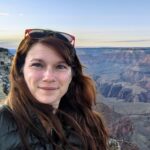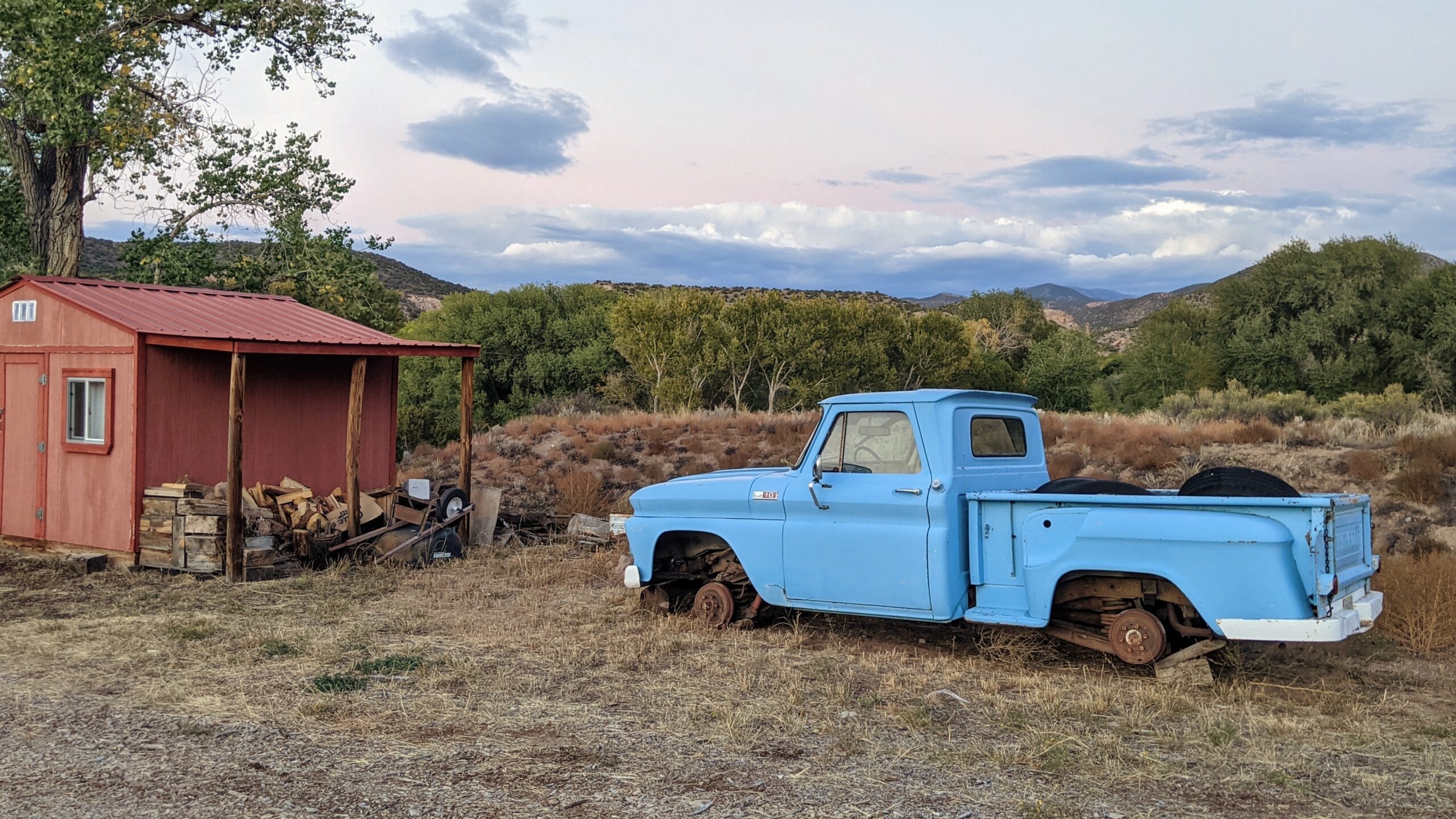My anxiety is rushing along with the river as I walk the trail through ancient cedars still dripping with rain. The wind shifts and the rhythmic coursing of water around stones is overtaken by the louder sound of traffic pouring down the interstate in the distance—a panicked staccato of humans racing at whatever speed they need. A plane flies overhead. And then another and another. I round a bend and dip into the canopy again, where birds chatter from every tree and the concrete chaos is momentarily silenced—until the path turns and the wind shifts again.
Weaving in and out of these sounds of Man and Nature, I eventually arrive at a grove of cedars so regal that my whirring mind is momentarily stunned into silence. Here, I find myself instinctively lying down on the forest floor, not caring about the wet seeping into my clothes as I clutch the damp earth and look down into the canopy that almost, but not quite, obscures the sky of noise outside.
Then another plane flies over. And another. In the spaces in between, I become aware again of the sound of birds singing in the distance—and that there is no sound from any of the trees directly around me. The grove is too close to the edge of the mountain and the noise of humans. Too many of us wanted to be near it and so we smothered its tranquility with our desire.
The post-vaccine summer “Revenge Travel” has begun again in earnest and like everyone else, I’ve been studying my bank account, my mind spinning at the prospect of taking a trip to any of the lands that I call home. The numbers are another rude awakening not only to the rising costs of fuel prices but also to the overwhelming ways in which our desperate pandemic movement has changed so many places in such a short time.
On the other side of these mountains and across the Great Pacific, my community in Hawaii has increasingly felt impossible to return to ever since the pandemic flooded it with work-from-homers, doubling the price of rents and flights and cars and everything else as everyone seeks a life in paradise without any of the struggles the locals had to face to have that life.
Thousands of miles behind me in the opposite direction, my aging father resigns himself to renting for his final years in the land that birthed him. He’d just sold his house in rural America right before buying a new one became impossible for locals who can’t compete with the city-folk seeking an escape to somewhere quaint. Gone, too, are travel plans—everything is too crammed full of RVs, every last hidden cabin or trailer for miles rented or bought with envelopes of cash.
To the south, across the border in another land I also once called home, migrants flood the rivers and sewage tunnels while planes carry more tourists in the opposite direction to live more cheaply while still maintaining their U.S. lifestyles. “It’s gross,” a Mexican friend told me recently, “there’s no other word for it. No one can afford to pay the same prices as the tourists and so more people will just be forced to leave.”
It occurs to me not for the first time that the era that allowed me to travel and even root myself in so many homes has now cost me the ability to ever return to them in a true sense of the word. Every year between visits increases the odds that the landscape I knew will be changed—whether by fires, floods and droughts, or by noise, gentrification and increasing swarms of humans seeking a piece of the “off the beaten path” before it’s gone.
I admit I’m not ready to give up my mobility. I cannot undo this web of communities I’ve woven. I cannot stop loving those lands and people. I know it’s selfish to ask others to stay away, to stop changing worlds that I once felt I belonged to but now feel further away from than ever before. I know that even though I lived for many years without a car in protest of the oil war, the flights I took in that time spit just as much carbon into the atmosphere beyond this grove. And I know that compared to the corporations that continue to destroy our only planet in pursuit of profit at all costs, someone wanting to take a vacation or get to know their world is not the real problem.
Still, I panic inside, clutching the earth like a child afraid of falling. I beg for more time. I try to imagine the mechanical rushing in the air around me is just another river, but deep inside, instinct warns of danger. It’s too fast, too rough, too flooded.
Then the wind shifts and in the return of momentary stillness, I remember that not-so-distant time in which we did what we’d previously declared impossible—and turned off the noise.
I’ll never forget that first night of standing under a silent sky, or the nights after in which the singing of millions of voices could be heard as we let each other know we were still here, like these birds chirping in the dusk around me now. How so many who’d reluctantly left their offices soon started talking with anxiety of returning to a life with a two-hour commute after a taste of a life with less traffic, less noise. How birds filled the trees and the wildlife stretched their horizons and children again saw raccoons and elk fawns and their own parents as if such an occurrence were normal.
I also can’t forget the fears brought by that great silencing of movement. That I might never see my loved ones again. That they wouldn’t be able to get enough food or medical care shipped to their communities. That a parent would die and no matter how fast I drove, there would be no way to get there in time to say goodbye.
Still, the first time the skies roared again with the miracle of rapid travel, I instinctively looked for a rock to throw at the annoyance and vowed to never live near an airport again. And I know I’m not alone. Some of us will admit it—quietly, or jokingly, or with caveats about not wanting anyone to suffer—that in secret, we miss at least some aspects of the Lockdown. That some of the small sacrifices were worth it.
And so as I listen to the chaos of humans racing through the mountains and sky around me, I try to imagine that for at least some of those travelers, each long-awaited trip away from Home will be a lesson in returning in a different way, with a deeper appreciation. That they will come to love places beyond their own communities so much that they’ll make the necessary sacrifices to protect them all. That we will find a way to move across this earth as humans have done since time immemorial but without displacing others from their homes. That we will find ways to lockdown both our carbon outputs and stress intakes again.
As the restrictions lift, we round the bend into the noise of man again—knowing beyond a doubt the impact our fossil-fuel-hungry lives are having on the environment, and also knowing beyond a doubt that we don’t ever want to be stuck again. But this time, we also carry the memory of a time when the impossible became possible overnight, in so many ways.

Jess Lee
JESS LEEis an environmental & community advocate drawn to borders, ecotones, and the shadows between the lines. She was raised in the forests of Appalachia and lived for many years in Mexico, Hawaii and the Pacific Northwest. Her short stories and essays have been published in Cutthroat, Burnt Pine, The Humanist and Z Magazine.

